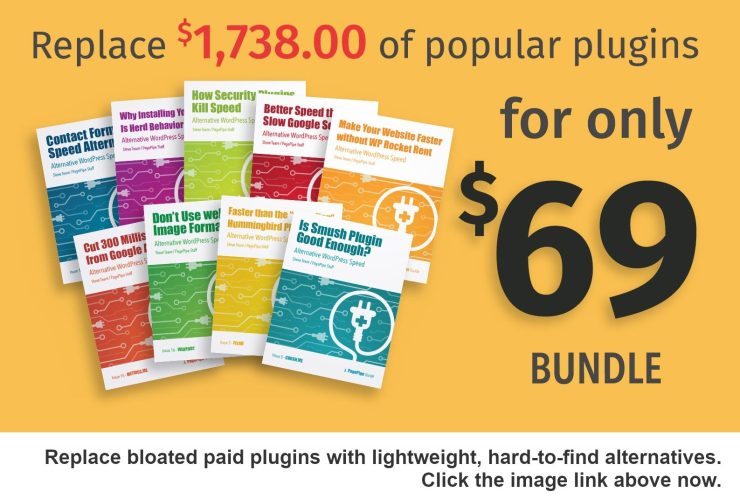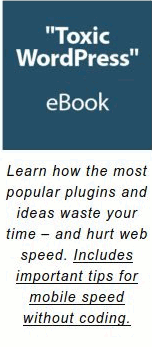Please remember relevant content is number one for SEO. Speed affects User Experience (UX). Good UX then influences metrics like dwell time, bounce rate, and click through. Google interprets those as user intent.
User intent is a major factor in search engine optimization and conversion optimization.
Speed affects page ranking less than 1 percent. But everyone hates a slow page. That’s not being hospitable or polite.
Speed is about kindness!
Common-sense tip number one: Good Titles.
Writing good titles for your WordPress posts should be obvious. But we’re always stunned at how many sites don’t use this simple tactic to improve Search Engine Optimization (SEO) and click through.
Page title is important. People choose to click your listing on the Search Engine Results Page (SERP) instead of nine other competitive page titles. A title arouses human curiosity. If it doesn’t, it’s a loser. The WordPress permalink is written for machines (search). It doesn’t need to match. Title is an important controllable indicator of relevant content in the search listings. This affects findability, too.
People read your article based on it’s title.
A good title reads like a headline. A plugin we used for a year is a good teacher for writing better titles. Title Experiments is a free plugin available in the WordPress plugin repository. The plugin allows you to test multiple title variations for any post or page.

★★★★★
Load Time: unknown
Title Experiments relies on the old classic WordPress editor. It won’t be updated to support Gutenberg block editor added in WP 5.x. This is the author’s excuse to ditch the paid plugin. It’s plain he’s disappointed by the lack of plugin income. No enthusiasm to go on.
Our workaround is simple. Use the Classic Editor Plugin with the Classic Editor Addon. So even if your core version is 5.0+ and your running PHP 7.x, things still work.
Title Experiments is a helpful plugin. We learned a lot about what titles work and what doesn’t for user engagement. But the heavy plugin was a top contributors to site drag. So we removed it after our education on writing better headlines (page titles).
Title Experiments relies heavily on the old editor of WordPress and will not be updated to support Gutenberg (WPv5.0+).
This is an author’s excuse to ditch the plugin.
Every year we review the last 4 months of traffic and see what is performing and trending. We’ve found our worst performing posts always have a lame headline (title). Renaming the post is the best thing to try first. We also dump dead posts or consolidate posts. This has proven effective for three years now.
For example, a mere label such as Ferritin and Hypothyroidism could be rewritten for human interest.
“What are optimal ferritin levels for hypothyroidism?”
That makes people curious and they click. Questions are always good. And including the word “you” is beneficial. Answer the readers question, “What’s in it for me?”
Purging your site is wise and focuses your content. That’s good positioning strategy. It affects perception of your site credibility.
MYTH: I’ve installed Yoast, so I’m all set
Sometimes, this statement makes me want to spit out my coffee and laugh; other times, it makes me sad that new bloggers can be so gullible and clueless.
Why?
Because this is an utterly ridiculous statement.
First, some newer bloggers mistakenly think that Yoast “gives them SEO.” And, of course, it doesn’t. In fact, there is no plugin that “gives you SEO.” There is no such thing. Rather the blog posts you write and the activities you do for a post will get you organic traffic. There is no silver bullet and no easy way around this.
Rather, Yoast attempts to measure your SEO. It uses some basic formulas that “check off” some of the boxes. Notice how I say “attempts.” This is because it’s very formulaic. And, also, it’s not very accurate nor predictive. In fact, often it gives you bad advice because it will direct you to do things that will lead to keyword stuffing (which is very bad for SEO) as well as poor writing, and that is bad for user experience. And, if it’s a bad user experience, it’s bad for SEO.
Many people mistakenly think that if they get a green light that their post is SEO optimized and will rank well. This simply isn’t true. Far from it. It’s all based on the keyword phrase that you enter. It does not tell you if that’s a highly searched term nor your chances of ranking for it. And, it’s simply garbage in/garbage out.
How to find out what you should be writing about?
Intuition is needed for what future content to add. Not just metric history evaluation. The best article to write probably isn’t even on your radar yet. Our best post ideas come from reader’s emails who have questions. When we’re done writing long answers, we convert the email into a post – or add to an existing post.
Analyzing your inquiries isn’t something Google Analytics can do. Except for one helpful thing:
If you go to Google Analytics > Behavior > Site content > View full report (down in the right hand corner), you’re shown the top 10 of xxx pages. In our case 378 pages, we then change the “show rows” to 400. You then can see all posts and pages by popularity. You will see some entries with the following format:
/?s=Beaver+builder
This line above originated from our WordPress search box. A human couldn’t find something they needed on our site. Important info. They wanted to know more about Beaver Builder page builder plugin.
We don’t have a Beaver Builder article. Do we need one? Maybe.
Going to the top of the GA page, there is an Export function on the right. We download the entire set for whatever period we choose and import that into a spreadsheet.
Then we categorize and sort the “searches.” The results reveal what people were looking for. We then test by doing a Google Search on the terms with the name “PagePipe.” That reveals what kind of placement the search phrase gets in the rankings.
This influences what we write about based on reader’s questions we’re not answering. So far this is helpful. How else can you learn what you don’t know?
From our recent analysis, we generated the following preliminary titles for future posts:
- Why don’t we write about good hosts? Why only the bad ones?
- How does cookie consent compliance affect speed?
- Measuring HTTPS/SSL drag with ByteCheck
- Why we don’t review paid themes
- Why we don’t recommend CDN
- How to use Cache Enabler plugin for speed.
- Is Imsanity plugin good for speed?
- How to use Autoptimize plugin for speed.
- Magnetic versus SSD hosting for speed
- What is site-origin optimization?
- Speeding up Astra theme
- Speeding up WooCommerce sites
- Why use twenty-seventeen theme instead of twenty-nineteen?
We then work on these article ideas one-by-one.
OTHER OFFSITE LINKS ABOUT WRITING GOOD TITLES
We Analyzed 912 Million Blog Posts. Here’s What We Learned About Content Marketing
Godspeed-
![]()
Steve Teare
performance engineer
February 2025
PagePipe Site Tuning Services for Speed
Instead of band-aid approaches, we drill down to the root cause of your slow site. This is origin optimization. Also known as site tuning. To do this, we analyze site components:
- Hosting
- Theme
- Plugins
- Scripts and third-party services.
- Images and media library.
- We minimize globally loading plugin effects.
Find out more details about Site Tuning – Get Speed!






